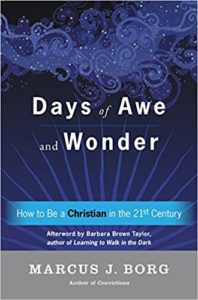 Today is my spiritual direction session — a once-monthly meeting with my spiritual director. It is an opportunity to take an hour to reflect purposefully, with the aid of another, on my ongoing relationship with the Divine. We might talk about where I have seen God’s touch in my life or where there appears to be (or needs to be) guidance concerning an issue now or going forward. My spiritual director has known me for many years, so she is able to draw connections with past conversations and past events in my life. Because she is also a widow, she has valuable insights into the feelings and movements of the grief process.
Today is my spiritual direction session — a once-monthly meeting with my spiritual director. It is an opportunity to take an hour to reflect purposefully, with the aid of another, on my ongoing relationship with the Divine. We might talk about where I have seen God’s touch in my life or where there appears to be (or needs to be) guidance concerning an issue now or going forward. My spiritual director has known me for many years, so she is able to draw connections with past conversations and past events in my life. Because she is also a widow, she has valuable insights into the feelings and movements of the grief process.
Spiritual direction can occur between two people of the same faith, or two people of differing faith traditions. The sessions offer a grounding with the Sacred through the listening presence and companionship of another person, one who has committed to set aside her/his own personal issues for the duration of the session in order to focus on those of the directee. In an ideal session, the director serves prayerfully as a conduit for the Holy Spirit.
Spiritual directors are available virtually all over the world. Where in-person, face-to-face sessions are not convenient, telephone or Skype sessions might be arranged. If you have an interest in learning more, or in contacting a spiritual director, visit the website www.sdiworld.org. The menu under “Find a Spiritual Director” offers as its first item the “Seek and Find Guide,” with instructions for using the Guide as well as listings for thousands of directors.
Spiritual direction is a valuable practice in everyday spirituality.




 You’ve surely heard the Biblical instruction “give thanks in all circumstances for this is the will of God for you.” It is Verse 18 of I Thessalonians 5. You certainly heard it if you were in a Christian church on Thanksgiving Sunday. Most people who point to this verse emphasize that we are instructed to give thanks IN all things, not FOR all things, indicating a prevailing attitude of trust and gratitude that we should maintain no matter what is going on in our lives.
You’ve surely heard the Biblical instruction “give thanks in all circumstances for this is the will of God for you.” It is Verse 18 of I Thessalonians 5. You certainly heard it if you were in a Christian church on Thanksgiving Sunday. Most people who point to this verse emphasize that we are instructed to give thanks IN all things, not FOR all things, indicating a prevailing attitude of trust and gratitude that we should maintain no matter what is going on in our lives. A friend sat down beside me Sunday before church and told me that she misses me. I knew, and so did she, that I haven’t missed any Sunday services. She meant something else, so I explained that it feels to me as though a buffer of gauze exists between me and the world. It’s that buffer that she senses. On Sunday it was 15 months to the day since my partner died. This gauze buffer is the current state of grief for me. My friend seemed to think it might be two years or more, so we surprised each other.
A friend sat down beside me Sunday before church and told me that she misses me. I knew, and so did she, that I haven’t missed any Sunday services. She meant something else, so I explained that it feels to me as though a buffer of gauze exists between me and the world. It’s that buffer that she senses. On Sunday it was 15 months to the day since my partner died. This gauze buffer is the current state of grief for me. My friend seemed to think it might be two years or more, so we surprised each other. Marcus Borg’s
Marcus Borg’s 




